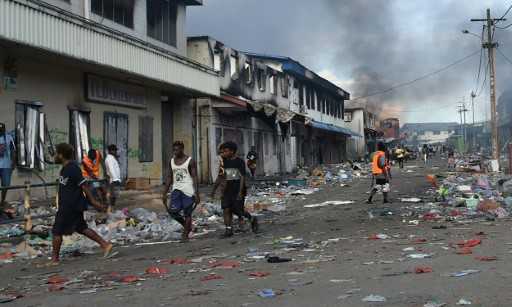Calm returns to Solomons capital after deadly riots
27 November, 2021

A tense calm returned to the Solomon Islands' capital Honiara Saturday, after days of rioting left at least three dead and reduced swathes of the city to smoldering ruins.
A handful of petrol stations, shops and other businesses gingerly began to reopen, with Honiara residents flocking to buy basic provisions as the violent unrest ebbed.
"The situation is very tense and anything could happen anytime," said Audrey Awao, a working mother who worried there would soon be no food left in the shops.
What began as a small protest on Wednesday quickly descended into a violent free-for-all, with poor Honiara residents joining anti-government protesters to rampage through the shattered glass and burnt-out remains of businesses for things to eat or sell.
For three straight days, angry mobs cut through the usually sleepy seaside capital, demanding the removal of prime minister Manasseh Sogavare.
Two years of pandemic-induced closed borders have left the already ravaged Solomons economy in tatters, deepening widespread joblessness and poverty among the population of around 800,000.
"Now PM need to step down" A self-employed 32-year-old who gave his name as Selson told AFP. "That's the demand for all citizens of the Solomon Islands."
Local police said a forensic team was working to identify the charred remains of three bodies found in a shop in the city's burnt-out Chinatown district.
A night-time curfew and the presence of roughly 150 foreign peacekeepers from Australia and Papua New Guinea appeared to cool tensions.
The scale of the recovery is now coming into sharp focus, even as the city remains on edge.
"It is very frustrating as it took me more than three hours to reach the fuel pump to get my vehicle fueled," Awao told AFP.
Many Solomon Islanders believe their government is corrupt and beholden to Beijing and other foreign interests.
"Most people are barely getting one meal a day, there are no tourists and very little economic stimulus," Douglas Kelson, chief officer at St John Ambulance Service, told AFP.
"People do things they normally wouldn't when they are hungry," Kelson said.
Anger was channelled directly at Sogavare and his government, with mobs attempting to torch parliament and the prime minister's private residence as police fired tear gas and warning shots.
Over 100 people have now been arrested for riot-related activity, Solomon Islands police said Saturday, as they tried to restore order.
"No one is above the law," said commissioner Mostyn Mangau, urging residents to "respect each other, as well as our visiting friends from abroad."
Police have moved to stamp out the violence, declaring a night-time curfew in Honiara.
Mobs had ignored an earlier 36-hour lockdown, with thousands of people -- some brandishing axes and knives -- roaming through the city's Chinatown, Point Cruz and business districts, according to AFP correspondents on the scene.
After days of mayhem, large areas of the capital have been left with the scorched-black shells of buildings, while streets are still littered with debris.
"We are living in fear," resident Josephine Teakeni told AFP. "At the moment it is very hard... children will be missing out from schools, lots of mothers will be jobless."
As tensions escalated, Sogavare had begged neighbors for urgent help.
In a letter obtained by AFP, the prime minister told his Papua New Guinea counterpart James Marape that "certain elements" had "attempted to overthrow a democratically elected government" and called for peacekeepers to be sent for a "period of three to four weeks".
In an address to the nation, Sogavare told citizens the Solomons had been "brought to its knees" by the rioting, but vowed to resist calls for his resignation.
The pro-Beijing leader claimed foreign powers opposed to his 2019 decision to switch the Solomons' diplomatic allegiance from Taiwan to China were behind the disturbances.
But others pointed to inter-island tensions and widespread joblessness among the country's population -- 40 percent of whom are under 14 years of age.
The archipelago nation has for decades endured ethnic and political tensions.
Residents of the populous Malaita province have long complained that their island is neglected by the central government, and divisions intensified when Sogavare recognized Beijing.
China's government on Friday condemned the violence and vowed to "safeguard the safety and legitimate rights and interests of Chinese citizens and institutions".
Source: japantoday.com
TAG(s):
